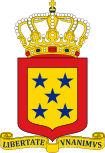Governor of the Netherlands Antilles
| Governor of the Netherlands Antilles | |
|---|---|
| Residence | Fort Amsterdam |
| Appointer | Dutch Monarch |
| Formation | 1845 |
| First holder | Teun Struycken |
| Final holder | Frits Goedgedrag |
| Abolished | 10 October 2010 |
 |
|---|
|
The Governor of the Netherlands Antilles was the representative of the Kingdom of the Netherlands in the Netherlands Antilles and the head of the Government of the Netherlands Antilles.
Duties[]
With the introduction of the Charter for the Kingdom of the Netherlands in 1954, the powers, obligations and responsibilities of the Governor as an organ of the Kingdom of the Netherlands were regulated in the "Regulations for the Governor"; Article 15, paragraph 1 reads:
The Governor represents the Government of the Kingdom and guards the general interest of the Kingdom in accordance with the provisions and regulations and with due observance of changes to be indicated by or pursuant to Royal Decrees. He w asaccountable to the Government of the Kingdom.
The Governor is therefore authorized, within the limits of these regulations and the instruction of the Crown, to act on behalf of the Government of the Kingdom of the Netherlands.
According to the Constitution, the Governor, as a representative of the King, was the head of the Government of the Netherlands Antilles. As the head of the Government, the Governor was immune. The Governor exercised executive power under the responsibility of the ministers, who are responsible to the Parliament of the Netherlands Antilles.
Dissolution[]
On 10 October 2010 the Netherlands Antilles was dissolved. With the Dissolution of the Antilles, Curaçao and Sint Maarten became constituent countries within the Kingdom of the Netherlands, while Bonaire, Sint Eustatius and Saba became special municipalities of the Netherlands. each constituent country within the Kingdom has its own governor. Bonaire, Sint Eustatius and Saba are represented by a gezaghebber
List of governors of Curaçao and Dependencies (1845-1954)[]
Before the introduction of the Charter for the Kingdom of the Netherlands in 1954, the Dutch Antilles was called Curaçao and Dependencies.
| no.1 | Name | Term of Service[1] |
|---|---|---|
| 1 | Rutgers Hermanus Esser | 1845–1848 |
| 2 | 1848–1854 | |
| 3 | Jacob Bennebroek Gravenhorst | 1854–1856 |
| 4 | 1856–1859 | |
| 5 | 1859–1866 | |
| 6 | Abraham Matthieu de Rouville | 1866–1870 |
| 7 | Herman François Gerardus Wagner | 1871–1877 |
| 8 | Hendrik Bernardus Kip | 1877–1880 |
| 9 | Johannes Herbert August Willem van Heerdt tot Eversberg | 1880–1882 |
| 10 | Nicolaas van den Brandhof | 1882–1890 |
| 11 | 1890–1901 | |
| a.i. | Theodorus Isaak Andreas Nuyens | 1901 |
| 12 | 1901–1909 | |
| 13 | Theodorus Isaak Andreas Nuyens | 1909–1919 |
| 14 | Oscar Louis Helfrich | 1919–1921 |
| a.i. | John Brown Gorsica | 1921 |
| 15 | 1921–1928 | |
| a.i. | Marius van Dijk | 1928–1929 |
| a.i. | 1929 | |
| 16 | Herman Bernand Cornelis Schotborgh | 1929–1930 |
| 17 | 1930–1936 | |
| a.i. | Frans Adriaan Jas | 1936 |
| 18 | Gielliam Johannes Josephus Wouters | 1936–1942 |
| 19 | Petrus Albertus Kasteel | 1942–1948 |
| a.i. | Cornelius Süthoff | 1948 |
| 20 | 1948–1951 | |
| 21 | Antoon Arnold Marie Struycken | 1951–1954 |
List of governors of the Netherlands Antilles (1954-2010)[]
following the introduction of the Charter, the Governor' position was officiated in the Constitution of the Netherlands Antilles
| no.1 | Name | Term of Service |
|---|---|---|
| 1 | Antoon Arnold Marie Struycken | 1954–1956 |
| a.i. | Frans van der Valk | 1956–1957 |
| 2 | 1957–1961 | |
| a.i. | Christiaan Winkel | 1961–1962 |
| a.i. | Aldert van Bruggen | 1962 |
| 3 | Nicolaas Debrot | 1962–1970 |
| 4 | Bernadito M. Leito[2] | 1970–1983 |
| 5 | René Antonio Römer | 1983–1990 |
| 6 | Jaime Mercelino Saleh | 1990–2002 |
| 7 | Frits Martinus de los Santos Goedgedrag | 2002–2010 |
Gubernatorial standards[]

1966–1986

1986–2010
See also[]
References[]
- ^ Benjamins, Herman Daniël; Snelleman, Johannes (1917). Encyclopaedie van Nederlandsch West-Indië. Digital Library for Dutch Literature (in Dutch). Leiden: Martinus Nijhoff Publishers. pp. 328–329.
Up to 1917
- ^ "The first Black Governor". Curacao History. Retrieved 12 February 2022.
External links[]
- Government of the Netherlands Antilles
- Governors of the Netherlands Antilles

